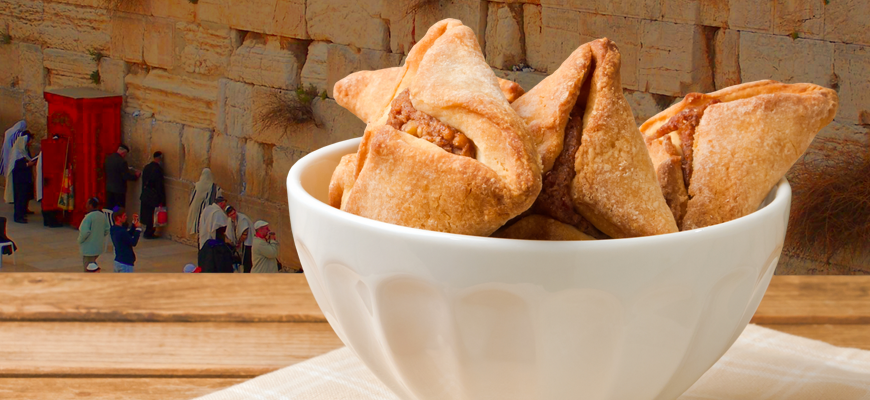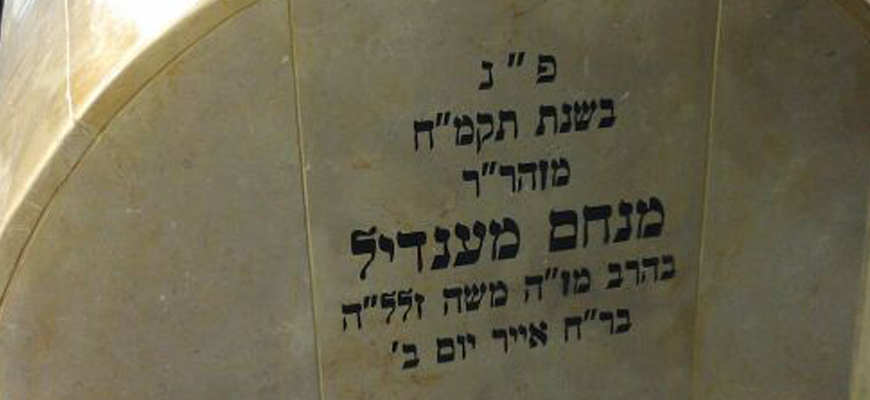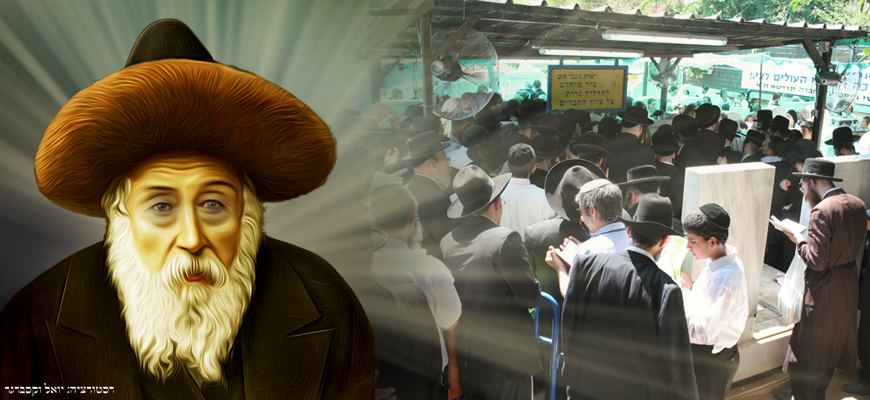For the soul of the deceased in the real world, saying Kaddish is a huge thing and we have no idea how much they wait for it. Orit Martin and Baruch Kastner bring in Hidabroot several stories that illustrate this well.
The the story of Rabbi Akiva, who saw a man who was naked and black as coal , and he was running like a horse racing with a large bundle of wood on his shoulder. When asked by Rabbi Akiva about his actions, the man answered him: “i’m a dead person, and every day I am attacked by angels who oblige me to chop wood, and then they burn me with them. Why? Because I violated all the commandments of the Torah.” Rabbi Akiva said to him: “Did you hear anything from your superiors, if you have a solution, to get rid of this calamity?” The man answered: “I heard that they say that if this poor man had a son, who stands in the crowd and says Kaddish , and blessed the blessed God, and the crowd answered after him Amen, they would have immediately released me from the punishment.” Rabbi Akiva asked him from what city he is, and he went there.
After a demand and investigation, Rabbi Akiva found the man’s son, while he was still a bachelor and not circumcised. Rabbi Akiva took him, and sat him before him to learn Torah, and he did not accept until Rabbi Akiva fast forty-day and prayed over him, and a Bat Kol came out and told Rabbi Akiva that his prayer had been accepted. So he went and taught him the Torah, reading the Shema, praying and blessing on the food. Then stood him in the crowd to say Kaddish, and the crowd responded after him. At that time they untied the dead man and freed him from the calamity.
In the Zohar the above incident is mentioned and there it is written that Rabbi Akiva taught him to say the Haftrah in the synagogue, and he did so, and he continued to teach him Torah until he was ordained with the title of rabbi, and then the dead man appeared in a dream to Rabbi Akiva, and he said to him : “Rabbi, may the Almighty have mercy on you as you have mercy on me, because when my son said Haftah, they removed from me the judgment of hell, and when he went to pray and said Kaddish, they tore up my sentence completely, and at the time that my son was crowned as a rabbi, I was crowned with the crown of the righteous and I was seated with them in Gan Eden.
How did The Steipler explain to a five-year-old boy the virtue of Kaddish
In the book “הליכות והנהגות ממרן בעל קהילות יעקב” זיע”א, it is said: A man passed away and left behind a little boy at the age of about five. The boy was ashamed to say Kaddish and all the entreaties and promises were of no avail.
They brought the boy to The Steipler, and he began to speak to the boy warmly and said to him: ‘Your father is in the world of truth, there is nothing there that is worth it, and if it is given to him all the silver and gold in the world, it is worth nothing to him. There only the Kaddish that you will say for him is worth to him. Do you know how much he is waiting for your ‘Kaddish’?! You should say, this is the greatest pleasure you can do for your father. Then the rabbi told him the story of Rabbi Akiva who said to one he should say ‘Kaddish’ for his father, And by this he will be saved from hell. The things affected the boy, and the very next day he began to say ‘Kaddish’ every day until the end of the year of mourning.
The wonderful story with Rabbi Akiva
מעשה ברבי עקיבא שראה אדם אחד שהיה עירום ושחור כפחם, והיה טוען (סוחב) על ראשו מטען גדול של קוצים, והיה רץ במרוצת הסוס.
גזר עליו ר’ עקיבא והעמידו ואמר לו לאותו האיש: ‘למה אתה עושה עבודה קשה כזאת? אם עבד אתה ואדונך עושה לך כך – אני אפדה אותך מידו, ואם עני אתה – אני מעשיר אותך’. אמר לו: ‘בבקשה ממך אל תעכבני שמא ירגזו עלי אותם הממונים עלי’.
אמר לו: ‘מה זה ומה מעשיך?’ אמר לו: ‘אותו האיש [הכוונה לעצמו] מת הוא, ובכל יום ויום שולחים אותי לחטוב עצים ושורפין אותי בהם’.
אמר לו: ‘בני, מה הייתה מלאכתך בעולם שבאת ממנו?’ אמר לו: ‘גבאי מס הייתי והייתי מראשי העם, ונושא פנים לעשירים והורג עניים’.
אמר לו: ‘כלום שמעת מן הממונים עליך, אם יש לך תקנה?’
אמר לו: ‘בבקשה ממך אל תעכבני שמא ירגזו עלי בעלי פורענות, שאותו האיש אין לו תקנה. אלא שמעתי מהם דבר שאינו יכול להיות: שאמלא היה לו לזה העני בן שהוא עומד בקהל ואומר “ברכו את ה’ המבורך”, ועונין אחריו “ברוך ה’ המבורך לעולם ועד”, או יאמר “יתגדל”, ועונין אחריו “יהא שמיה רבא” , מיד מתירין אותו האיש מן הפורענות. ואותו האיש לא הניח בן בעולם, ועזב אשתו מעוברת ואינו יודע אם תלד זכר מי מלמדו, שאין לאותו האיש אהוב בעולם’.
באותה שעה קיבל עליו ר’ עקיבא לילך ולחפש אם הוליד בן כדי שילמדו תורה ויעמידו לפני הציבור.
אמר לו: ‘מה שמך?’ אמר לו: ‘עקיבא’. ‘ושם אנתתך (אשתך)?’ אמר לו: שושניבא. ‘ושם קרתך (עירך)?’ אמר לו: ‘לודיקא’.
מיד נצטער ר’ עקיבא צער גדול והלך ושאל עליו. כיוון שבא לאותו מקום שאל עליו. אמרו לו: ‘ישתחקו עצמותיו של אותו רשע!’ שאל על אשתו. אמרו לו: ‘יימח זכרה מן העולם!’ שאל על הבן. אמרו: ‘הרי ערל הוא, אפילו מצוות מילה לא עשה’.
מיד נטלו ר’ עקיבא ומלו והושיבו לפניו, ולא היה מקבל תורה עד שישב עליו ארבעים יום בתענית.
יצתה בת קול ואמרה: ‘ר’ עקיבא, לך ולמד לו!’ הלך ולמדו תורה וקריאת שמע ושמונה עשרה וברכת המזון, והעמידו לפני הקהל ואמר: “ברכו את ה’ המבורך”, וענו הקהל: “ברוך ה’ המבורך לעולם ועד”, “יתגדל… יהא שמיה רבא”.
באותה שעה מיד התירו המת מן הפורעניות. מיד בא לר’ עקיבא בחלום ואמר: “יהי רצון מלפני ה’ שתנוח דעתך בגן עדן שהצלת אותי מדינה של גיהינום”. מיד פתח ר’ עקיבא ואמר: “ה’ שמך לעולם ה’ זכרך לדור ודור”. וכן מצא מורי הר’ אלעזר מוורמשא בתנא דבי אליהו רבה: הקטן האומר “יתגדל” מציל אביו מן הפורענות”.
(אור זרוע, ח”ב, הלכות שבת, סימן נ)
In the book “Yesh Nochalin” it is mentioned in the name of the Zohar Chadash, that when the man came to Rabbi Akiva in a dream, he said to him: “At the time when my son said Haftara, it made it easier for me in hell. And when my son was Chazan and said Kaddish for me, my all sentence was teared. And at the time he learned Torah, I got a part in Gan Eden.”
Kaddish Yatom at the airport
Rabbi Mordechai Gifter said: I was invited by one of my students to his wedding. Since the wedding was held in a place far from where I live, the student sent plane tickets for me and eight other friends who were also invited to the wedding. On the appointed day we set off as soon as possible to reach the Chuppah in time, but when we approached the landing destination, the plane were not able to land there due to very heavy fog. Involuntarily we continued to fly until we arrived at an airport far away from the place where the wedding was held.
When we realized that we wouldn’t be able to reach the Chuppah on time, and we wouldn’t be able to daven Mincha with minyan, we prepared to daven Mincha individually at the airport. We asked one of the porters we met on our way to direct us to a place where we could pray undisturbed, the anonymous porter brought us to a side room at the airport, we started to pray and the porter stayed at the door of the room and looked over the nine of us.
When we finished the prayer, the porter asked to our surprise: “Why didn’t you say Kaddish?”
When we answered him that we lacked the tenth of the minyan, he repeated and asked: “I am not a Jew?…” and immediately stood up and said Kaddish.
Then the man told them excitedly: “Today is the anniversary of my late father’s death. It’s been a long time since I lifted the burden of Torah and mitzvot, and of course I don’t pray either. Last night, my late father appeared to me in a dream and said to me: ‘Today is the day of my Yarzeit, and I command you to say Kaddish for me.’
I told him: ‘I don’t pray, and even if I wanted to say Kaddish I couldn’t, because where I am there are no Jews.’ But father repeated and said: ‘I will see to it that you have a minyan, and you say Kaddish.’ When I got up in the morning I said to myself: ‘I will not say Kaddish! But now that I have seen how my father’s words are being fulfilled, and with the help of God, nine kosher Jews were brought here from a great distance, I could not refrain from saying: יתגדל ויתקדש שמיה רבא…”
Deceased people ask in a dream that it should be said Kaddish after them
Many people say that they dream of the souls of their deceased relatives coming in the dream and ask them to say Kaddish after them, because it has the power to help them a lot in the law that is done with them.
However, when the Kaddish is said quickly and subtraction of letters, the benefit from the Kaddish is very little.
The power of saying the Kaddish to protect and save the soul of the deceased is very great. However, it is forbidden to aim the Kaddish at the benefit of the soul of the deceased, according to the fact that the main part of the Kaddish is praise and prayers that God’s name shuold be increased.
In two places you can aim for the benefit of the soul of the deceased:
1. In the saying “יהא שלמא רבא… ועל כל ישראל”, it is possible to mean “all Israel” also for the soul of the deceased.
2. By saying “עושה שלום במרומיו” it should be meant that the soul of the deceased will also have a blessing of peace from God, who makes peace in his high places.
(עולת תמיד עמוד נ, בשם דרכי חיים)
A terrible story that was witnessed by Rabbi Chaim Zonenfeld, zt’l, and was quoted in the book “האיש על החומה” (חלק א עמוד 345) and we have copied it here:
A respectable woman with an established business in the city of Pressburg, Hungary, used for many years to occasionally make a decent contribution to the yeshiva, on the condition that they say a constant kaddish at the yeshiva for the uplifting of those lost souls who have no one to say kaddish after them, and the yeshiva’s management appointed a special person to say kaddish for the merit of these souls. Later, the husband of that woman passed away, and since he managed the business with her, his death affected the business, and it shrunk until it was eliminated. The woman’s financial situation was getting worse, and in the many days another burden fell on her, when her two daughters were about to get married, and money from where?
The woman bore her suffering in silence, and resigned herself to her fate. However, she could not give up on one thing, and her heart was extremely bitter, and it hurt her very much, this was the matter of keeping the Kaddish, which could be canceled since she stopped supporting the Yeshiva. The widow appealed to the management of the Yeshiva with a request to continue the observance of the Kaddish, until God expands its borders and she will return supporting the Yeshiva as before. The leaders of the Yeshiva were very moved by the sincerity and righteousness of this widow’s soul, and promised her to fulfill her request, to keep the Kaddish saying as before. This promise filled her soul with endless happiness, and when a gleam of happiness shone from her mournful eyes, she said goodbye to the leaders of the Yeshiva and turned to go her way. From now on, her condition did not bother her so much, nor did the condition of her two daughters who had to get married. Since then, she has been promised the Kaddish matter for lost souls, she lacks almost nothing in the world of God, and in the matter of her two daughters, she trusts in God, the father of orphans, who will surely see the poverty of her daughters, and arrange for their marriage and all their needs.
When she went out into the street, an old Jew with a rare facial expression, and a long white beard, came to her and greeted her with peace. The woman was surprised by the heartfelt expression of the old man’s unfamiliar face to her, her surprise increased when the old man started talking with her, taking an interest in her condition and the condition of her daughters. The woman sighed heavily, and laid before him her fate, to the point that she does not have the necessary means to marry her adult daughters.
“What is the approximate amount you need for your daughters’ marriage expenses?” asked the old man.
“Why is it important for his honor to know?” the woman replied awkwardly, and said the estimated amount.
The old man pulled out a sheet of paper, and wrote down an instruction to the local bank to pay the woman the amount she needs. However, before signing the check he expressed a wish, since it is a very large amount, it is desirable that his signature be in the presence of witnesses, who will see with their own eyes when he personally signs the check, and confirm it with their signature.
Excited and surprised by what happened, she went up to the yeshiva hall and asked two guys to accompany her. When the old man saw them, he asked them to observe how he put his signature on the payment order, and just to be sure, he asked them for a piece of paper, and wrote his signature on it as a souvenir and example. Handing the check for the considerable amount to the woman, he ordered her to go cash the check the next morning. The whole matter seemed strange to the shocked woman, what did the unfamiliar old man see to beave to her like that?! And show such generosity to the extent of covering the expenses of the marriage of her two daughters?! Nevertheless, she hurried to the bank the next day, and with a beating heart tried her luck.
When the bank clerk examined the check, he gave the woman a wondering look, looking once and twice and all embarrassed and puzzled. Expressing signs of embarrassment, he asked the woman to wait, and with the check in his hand, he entered the room of the bank manager, who was also his owner. Then something very dramatic happened… when the bank manager saw the check he fell from his chair and passed out. There was a commotion in the bank, the officials who heard about what was happening, immediately put the woman in a side room, and put a guard over her to prevent her from escaping, suspecting fraud. After the bank manager’s spirit returned, he asked to see the woman who presented the check to the cashier. When she entered, the manager asked in a panic, when and how did you receive the check?
“Just yesterday I received it from a respectable Jew, and there are even two witnesses who saw the writer of the check when he signs it,” the woman replied apologetically.
“Would you recognize the man if I show you the picture?” asked the manager.
“I will definitely recognize him, and I have no doubt that the two guys will be able to recognize him as well” she answered.
The manager ordered the portrait of his late father to be brought before him, and when the woman was shown the photo, she pointed to him without hesitation as the man who gave her the check. The manager ordered the check to be cashed, and released the woman. After she went, the manager told those present the meaning of the strange affair that unfolded before their eyes, the man who handed the check to the woman was none other than his father who passed away about ten years ago, the previous night his father appeared in his dream, and said to him in this language: “You should know! That since then you have deviated from the right path and married a non Jewish woman, and you stopped keeping the Kaddish, I did not find rest for my soul, until an unknown woman came and ordered to say Kaddish for the benefit of souls who are not said Kaddish after, this Kaddish that was said in the yeshiva according to the woman’s command caused an uplift and satisfaction to my soul, this woman will appear tomorrow in the morning at your bank, With the check I gave her to cover her two daughters’ wedding expenses.” When I got up in the morning excited by the dream, I told my wife, who scoffed at the whole thing, but when the woman appeared with the check, it was confirmed that the dream was indeed true.
And the Gaon Rabbi Chaim Zonenfeld ended: “Who were the two guys? Me and my friend Rabbi Yehuda Greenowald!
Another thing in saying the Kaddish is צידוק הדין, as it’s written in ‘Sefer Hachaim’ (the end of chapter 8) and these are his words: “עיקר תועלת הקדיש לנפש הנפטר היא לפי שאין מיתה בלא חטא. רוב ההולכים לעולמם נפטרים בגלל עוון חילול השם, שאין לו כפרה, אלא מיתה. וכאשר הקב”ה נפרע מהחוטא, שמו של הקב”ה מתקדש, שנאמר: “ונשפטתי”, ואח”כ: “והתגדלתי והתקדשתי”.
(שם, בשם ספר החיים).
In saying the Kaddish there is ‘Tziduk Hadin’
There is another matter in saying the Kaddish, and it is the justification of God’s judgment, because when the Almighty pays the man for his sins, the name of the Almighty is sanctified, as it is said: “ונשפטתי”, and then: “והתגדלתי והתקדשתי”, therefore the son of the deceased stands and says: “יתגדל ויתקדש שמיה רבא”
Remembrance of the souls on Shalosh Regalim (“Yizkor”)
The custom of remembering souls is ancient, as mentioned in the Tenchuma, the beginning of Parshat Haazinu:
“That is why it is customary to remind the dead on Yom Kippur and to pledge charity for them.” And see there that mentioning the name of the deceased and giving charity for him, raises the soul in its level, and the deceased gets to sit among perfect righteous people in the upper world.
Another source that explains the matter of remembering souls is the Midrash Aseret ha-Dibrot, there it is explained that in the firmament called “זבול” there is a ‘בית מקדש של מעלה’. And the Midrash there adds: “ובזבול יש מזבח בנוי, ומיכאל שר של ישראל, הוא כהן גדול בשמים ועומד ומקריב עליו קרבן בכל יום ויום. ומה הן הקרבנות שהוא מקריב? אמרו חכמים: ‘מיום שחרב בית המקדש, שייבנה במהרה בימינו, ובטלו כוהנים, הוא מקריב נשמתן של צדיקים, עד שיבנה בית המקדש”. This means, that the souls of Israel ascend to the upper world through the ‘upper temple’ as the korbanot ascend on the Mizbeach.
The Tosfot in מסכת מנחות דף ק”י say that this is the intention of the text of the prayer: “ואשי ישראל ותפילתם מהרה באהבה תקבל ברצון”.
These ‘אשי ישראל’ are those souls who separate from this world and ascend to the upper world. There in the ‘upper temple’, “מזבח בנוי, ומיכאל שר הגדול עומד ומקריב עליו קרבן” – as the Sages say there, and G-d accepts these souls with love as a Korban along with all the prayers of Israel. This is also the point of the continuation: ‘ותחזינה עינינו בשובך לציון’, that is, the raising of the souls of Israel as a Korban on the upper Mizbeach, brings closer the hour when our eyes will see God’s return to Zion.
In the book ‘Kev Hyashar’ the author explains why it is customary to remember souls not only on Yom Kippur, as stated in the Midrash, but also in Shalosh Regalim. For, on Pesach, Shavuot and Sukkot, all jews gathered at the temple in Jerusalem and were “standing crowded and bowing widely”. In his later words, is brought the tradition that during the gathering of the jews, the souls of the nation’s ancestors and all the souls of Israel are also present. These souls come down from the upper temple as partners in the gathering of Klal Israel in Jerusalem. (This is like the example of Har Sinai, where all the souls of Israel were ther, as stated in the Midrash on the verse: “את אשר ישנו פה עמנו עומד היום ואת אשר איננו פה עמנו היום”).
And the ‘Kev Hyashar’ concludes: “ולכן עכשיו, שחרב הבית בעוונותינו, צריכים אנו להזכיר את נשמות אבותינו הקדושים בכל רגל ורגל, כדי שתהיה זכותם עומדת לנו לעד… לכן נותנים צדקה בעד הזכרת נשמתם… ואז הם פרקליטים גדולים (סנגורים לאדם) כשמקיים האדם את הנדר… ואז הקב”ה ישלח ברכה והצלחה במעשה ידיו.”
As stated above from Midrash Tanchuma, the purpose of charity is not only for the success of living people, but as soul upliftment for the deceased, whose souls gather on Yom Tov at the ‘Upper Temple’, and that they may sit among perfect righteous people in the upper worlds.








